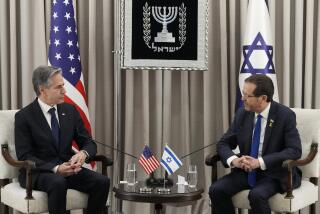Iraq withdrawal plan offers a ray of hope
Finally, we think we see light at the end of the Iraq tunnel. Over the weekend, the Iraqi Cabinet approved a plan hammered out by the government of Prime Minister Nouri Maliki and U.S. officials to restrict U.S. combat operations starting Jan. 1, pull American troops out of cities by June and withdraw from the country entirely by the end of 2011. The Iraqi parliament started debating the pact Monday and, with luck, will approve it next week. The timetable is too long for Iraqis who would like to see the full devolution of sovereignty in December, when the U.N. mandate governing the U.S. presence ends, and too imperfect for those who fear what will happen when U.S. troops leave. Nonetheless, although President Bush long opposed it, there is a timetable at last, and one that could mark the beginning of the end of the U.S. occupation of Iraq.
The agreement sends two important messages to the international community: First, the United States truly does not plan a permanent military presence in Iraq, and second, it will not launch attacks on neighbors from Iraq. The accord bans U.S. cross-border raids, a pragmatic concession by the administration to seal the deal. The United States, however, is not the only party to exercise pragmatism here. Iraq’s leading cleric, Grand Ayatollah Ali Sistani, said he would not object to the pact if it was supported by a majority of legislators. Iran’s judiciary chief, Ayatollah Mahmoud Hashemi Shahroudi, also said that the Iraqi Cabinet had done “very well” to approve it. Iran apparently wants to send a conciliatory message to President-elect Barack Obama.
If those leaders have been wise to grasp this moment of opportunity, it is not because they are naive about the challenges. Indeed, the agreement presents problems for all parties in Iraq. Maliki risks looking too pro-American ahead of upcoming provincial elections. Shiite leader Muqtada Sadr and many Sunnis oppose the deal, although they probably don’t have the votes to block it in parliament. The Kurds probably would prefer to have U.S. troops around awhile longer. Even if parliament approves the pact, the president and his two deputies must ratify it, meaning that Sunni Vice President Tariq Hashimi could cast a veto. We sincerely hope that isn’t the case.
Precisely because it is difficult and requires compromise, passage of the so-called status of forces agreement would be a huge step toward ending the U.S. occupation and fostering an Iraqi culture of governance. It would put an end to negotiations that had been sucking the oxygen out of Iraqi politics for a year and would allow the country to move on to other issues of nation building, such as regional elections that should bring more Sunnis into the political process and an agreement to distribute oil revenue among the sects and regions. A pullback from Iraq would allow the United States to restore its credibility abroad and, just as important, to begin to heal the wounds inflicted by the war at home.
More to Read
Start your day right
Sign up for Essential California for news, features and recommendations from the L.A. Times and beyond in your inbox six days a week.
You may occasionally receive promotional content from the Los Angeles Times.






